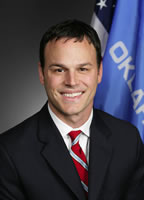Rice Calls Chamber Memo a ‘Red Herring’, Says Insurance Mandates Save Lives, Reduce Health Care Costs
 Sen. Andrew Rice
Sen. Andrew Rice
A recent State Chamber of Commerce memo to members of the Oklahoma State Legislature exaggerates the cost of legislative mandates for insurance coverage, State Senator Andrew Rice (D-Oklahoma City) said today.
“The truest statement in this memo is that the cost of health insurance continues to spiral upward,” Rice said. “However, the Chamber offers no proof that insurance mandates are among the reasons why.”
Rice is Senate co-author of “Steffanie’s Law”, legislation to require private insurance companies in Oklahoma to continue coverage of routine medical care costs even after a cancer patient enrolls in experimental clinical trials. The bill was inspired by the late Steffanie Collings, who recently died at the age of 18 after fighting brain cancer for four years.
Collings’ parents are now strapped with over $450,000 in unpaid medical bills because the family’s insurance company disqualified Steffanie from coverage after she participated in clinical trials to find a possible cure.
“Republican leaders in the House of Representatives and their allies in the insurance industry continue to make insurance mandates the fall guy for rising health care costs,” Rice said. “However, research by the American Cancer Society shows that there is very little difference in the cost of routine medical care for patients in clinical trials and patients who do not participate.”
Research has shown that lack of insurance coverage is a significant barrier to many patients who might otherwise enroll in a clinical trial. Lack of coverage also makes it harder for researchers to successfully conduct trials that could improve prevention and treatment options, Rice said.
Rice pointed to other examples where insurance mandates have led to healthier lifestyles and reduced health care costs in the long run. A 1996 legislative mandate that required insurance companies in Oklahoma to cover costs of diabetes testing and treatment is one example.
“Diabetes is a devastating disease that affects more than 20 million Americans and unless they were forced to do so, some health insurance companies would not cover the costs of tests that can detect it early and prevent heart disease, strokes and other complications,” Rice said. “When the Chamber of Commerce claims that every mandate increases health insurance premiums, they are ignoring the long term health savings that occur when patients are encouraged to seek preventive treatments.”
Rice also cited breast and colorectal screenings as examples of early detection treatments for women that help prevent high-cost cancer illness later on.
“The Chamber of Commerce asks Members of the Legislature to continue allowing the free market to pick winners and losers among cancer patients,” Rice said. “However, on numerous occasions a bipartisan majority in both the House and Senate have made it clear that we want fairness and common sense in the treatment of our constituents by insurance companies in Oklahoma.”
Rice said that various studies in the 24 states that currently mandate coverage of routine medical costs for patients in clinical trials indicate that it adds less than 1 percent to the immediate cost of insurance. Patients on Medicare who elect to undergo clinical trials retain coverage of their medical expenses. Cost of the clinical trials themselves are normally paid by prescription companies and health care research facilities where they are conducted.
In the current state legislative session, Rice has gained passage of Steffanie’s Law by a bipartisan majority in the State Senate but the bill has remained blocked in the Republican-controlled House of Representatives.
 Oklahoma Senate
Oklahoma Senate

